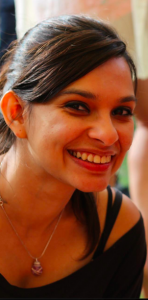
Manda’s main research interest is understanding the formation and evolution of distant galaxies and the supermassive black holes that live at their centres. She has been involved in the DES project since her early PhD days some 10 years ago! Back then (before DES started collecting data) she worked on ways to use the multi-colour data from DES to calculate crude distances or redshifts to galaxies – a technique known as photometric redshift estimation. Nowadays she spends most of her time using the beautiful DES data to find new populations of very distant galaxies and powerful supermassive black holes or quasars, which can be used as laboratories for testing our ideas of early galaxy formation. She co-lead the Galaxy Evolution & Quasar Science Working Group within DES.
We asked Manda a few more questions — here’s what she had to say:
What is your favorite part about being a scientist?
The best part about being a scientist is always having something interesting, exciting and challenging to work on. I love the fact that you never stop learning new things in this job. Being an observational astrophysicist, one of the most fun parts of my job is looking at pictures of the Universe that no one else has ever looked at, and within those pictures, finding all sorts of hidden gems and treasures!
When did you know you wanted to be a scientist?
I have been interested in science and space for as long as I can remember but I can pin-point the exact day that I decided I wanted to be an astrophysicist. It was on a family trip to Florida when I was 10. I was lucky enough to get a chance to visit the Kennedy Space Center and see a rocket launch. I remember coming back home from that trip and being quite decided that when I grew up I was going to be an astrophysicist. Everything in my life since then was about getting the necessary qualifications to be able to realise that dream.
What motivates / inspires you?
The fact that there is still so much we do not understand about our Universe and the fact that collectively, as a society, so many of us are united in our quest to push the boundaries of technology and try and probe a little bit deeper to further our knowledge.
If you weren’t a scientist, what would your dream job be?
A novelist of some sort. I love reading and writing (though unlike most scientists, I absolutely detest sci-fi and am much more of a Jane Austen/Charlotte Bronte girl myself!). I really admire the way a good novel can transport you to a completely different world much in the same way studying the Universe does!
What do you think has been the most exciting advance in physics / astronomy in the last 10 years?
The recent detection of gravitational waves with LIGO. As somebody who works on black-holes, the most exciting part of the discovery for me was the fact that the detection essentially marked us “hearing” two enormous, but otherwise invisible, black holes colliding into one another. Before the LIGO gravitational wave detection, we didn’t know that black-holes of this mass were out there in our Universe.
Any advice for aspiring scientists?
Be true to who you are. Regardless of what popular culture and the media might sometimes try to tell us, successful scientists come in all sorts of guises and it is essential for the field that we attract people who think in many different ways. Never let anyone convince you that you cannot succeed in science because you do not conform to a particular stereotype. As long as you are passionate, enthusiastic and hard-working, you have pretty much all the ingredients you need to be a great scientist!
